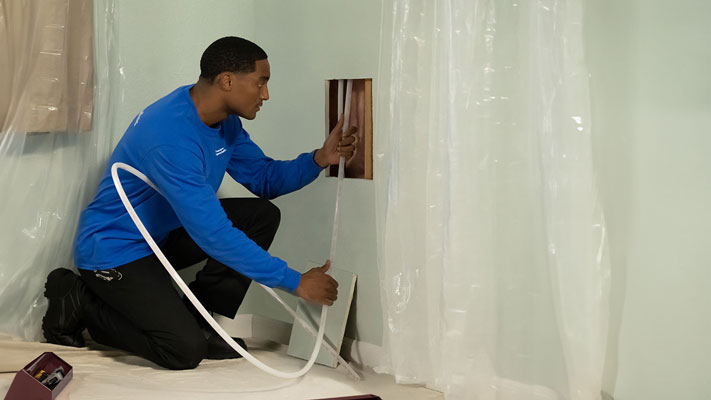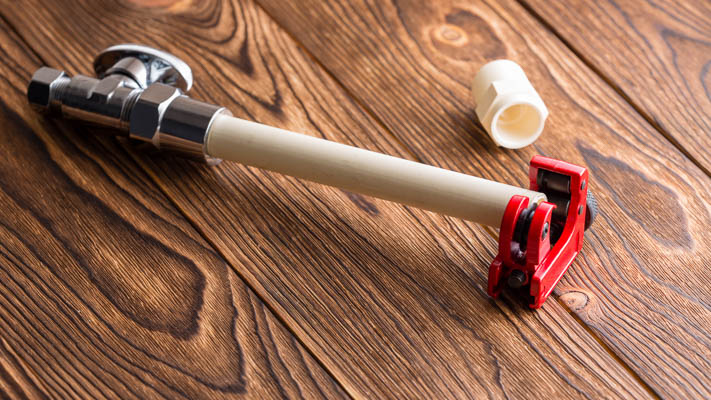What Is CPVC Piping?
CPVC, or Chlorinated Polyvinyl Chloride, is a thermoplastic pipe and fitting material commonly used in residential, commercial, and industrial plumbing systems due to its ability to withstand high temperatures and corrosive chemicals.
One of the key characteristics of CPVC piping is its chlorinated structure, which enhances its heat resistance and chemical stability. Most CPVC pipes can handle temperatures up to 200 degrees Fahrenheit. This feature makes CPVC piping suitable for a wide range of applications, including residential plumbing systems, commercial buildings, and industrial settings.
Additionally, CPVC piping's smooth interior surface minimizes friction and reduces the risk of clogs and blockages. There are several easy ways to identify if you have CPVC pipes.
How Does CPVC Piping Differ From PVC Piping?
While both CPVC (Chlorinated Polyvinyl Chloride) and PVC (Polyvinyl Chloride) are very similar, they have several key differences that make them suitable for different applications.
CPVC piping is specifically designed to handle hot water applications, with a maximum temperature rating typically ranging from 180°F to 200°F, depending on the manufacturer. PVC piping, on the other hand, is suitable for cold water applications and has a lower maximum temperature rating of around 140°F.
While PVC piping is typically used for cold water supply lines, drainage systems, and non-pressure applications such as irrigation, CPVC piping is more commonly used in residential and commercial plumbing systems for hot water distribution.
It's important to note that CPVC and PVC piping are not compatible with each other and should not be used together in the same plumbing system. Attempting to connect CPVC and PVC pipes can result in leaks or failure at the joints due to differences in their chemical composition and expansion rates.
What are the Common Problems With CPVC Pipes?
While CPVC (Chlorinated Polyvinyl Chloride) piping was once known for its durability and versatility, it can experience certain issues over time. Here are some common problems associated with CPVC pipes:
- Brittleness: CPVC pipes can become brittle over time, especially when exposed to prolonged sunlight or high temperatures. This brittleness may lead to cracks or fractures in the pipes, resulting in leaks and water damage.
- Chemical Degradation: While CPVC pipes are generally resistant to corrosive chemicals, certain aggressive chemicals or solvents may still cause deterioration over time. This can weaken the pipes and compromise their structural integrity, leading to leaks or failures.
- Expansion and Contraction: CPVC pipes are more susceptible to the effects of thermal expansion compared to metal pipes. As a result, they may expand and contract significantly with changes in temperature, potentially causing stress on joints and fittings and increasing the risk of leaks.
- Joint Failures: Most CPVC pipes are connected using glue. The adhesive on these joints can loosen over time, either due to contact with certain chemicals or expansion and contraction caused by changes in temperature.
What is the Best Alternative to CPVC Piping?
While CPVC (Chlorinated Polyvinyl Chloride) piping has its advantages, such as affordability and ease of installation, there are alternatives that offer distinct benefits over CPVC.
PEX (Cross-linked Polyethylene) piping emerges as the best alternative to CPVC, offering numerous advantages that can cater to your plumbing needs:
PEX Tubing
PEX piping is highly flexible, allowing for easy installation around obstacles and in tight spaces without the need for additional fittings or joints. This flexibility reduces the risk of leaks and simplifies the installation process.
Unlike CPVC, which can become brittle and prone to cracking in freezing temperatures, PEX piping is resistant to freezing and can expand without bursting, making it suitable for cold weather climates.
PEX piping is resistant to corrosion and can be used for both hot and cold water applications, making it a versatile choice for residential and commercial plumbing systems. Most of our full home repipes utilize modern Uponor PEX tubing.

PEX typically lasts 50 years or more compared to CPVC, which normally lasts between 25 to 40 years. This means that homeowners are less likely to need to replace their plumbing systems due to wear and tear. A full home PEX repipe is often more cost-efficient than repairing costly damages and replacing old CPVC pipes as they fail.
We have a detailed article that outlines why PEX is a good replacement for CPVC pipes.
When considering the replacement of CPVC plumbing, a complete home repipe is always more convenient and cost-effective. By opting for a complete repipe of your CPVC pipes with PEX tubing, you can efficiently address any systemic issues while ensuring your peace of mind when it comes to your home's plumbing.
Get your free estimate today
With over 75,000 repipes completed, we've perfected our One-Stop Repipe™ for your home.
Get a Quote for Repiping Your CPVC Pipes
Here at Repipe Specialists, we've fully replaced CPVC in thousands of homes across the USA using PEX. We continually get positive customer feedback from customers about their whole home repipe experiences. We often exceed their expectations on:
- Speed: Our repipe crews typically complete a repipe in a day, returning on another day for wall patching.
- Convenience: Through our One-Stop Repipe™ Process, we handle everything from permits, to wall patching, to inspections.
- Cleanliness: Our crews are trained to protect your home while working (we cover all surfaces with protective sheeting), and to clean up fully at the end of each day.
- Peace of Mind: Repipe Specialists is a fully licensed plumber in every state we operate in, and we back all of our repipes with a lifetime warranty.
- Financing programs: To help take the sting out of unplanned repipe expenses, we offer several financing programs.
- Price: As a specialist that performs hundreds of repipes a week, we can deliver high quality repipes at a lower cost vs generalist plumbers. We have an article that cover repipe cost factors in detail. Our quotes typically range from $4,500 to $15,000 depending on the size and complexity of your project.
Schedule a free in-home consult, and one of our local repipe consultants will explain all your repipe options and provide you with a written, fixed-price quote. Repipe your outdated CPVC, use PEX.

